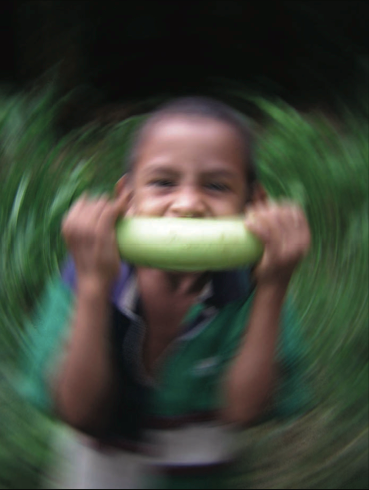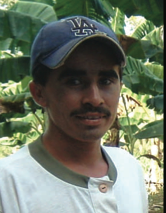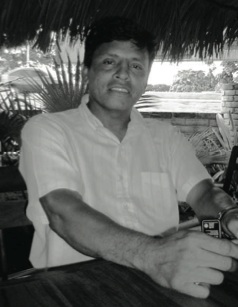
Newsletter – Vol. 2 – Fall 2005
Self-Funding Is Becoming A Reality
More than a year ago, in April 2004, the families planted 5,000 plantain seeds with the help of a crew from Castleton State College in Vermont. It was laborious and sweaty work. But where once we dug holes in the sweltering sun, we’re now harvesting sumptuous fruit from a two-acre shade-forest of plantain trees. And as of June 2005, we’ve been generating income for the Project and for the families!!
We started the chaguite (cha- WEE-tay) project to encourage the families to work cooperatively. It’s still not popular with them, but they don’t mind the income one bit!
We’re not talking thousands of dollars yet, but the plantains have generated several hundred in the first three months of harvesting. The money has been divided in a 40-40-20 percent ratio, with the families and Project receiving equal amounts, and one-fifth re- served for maintaining the trees.
One of the beauties of plan- tains is that as the plant generates fruit, it also sprouts a baby tree that will grow and give fruit. This self-propagation can continue for two or three more generations.
The plantain is a staple of the Nicaraguan diet and can be pre- pared in many delicious ways.
Taking Risk Pays Off for High-School Student
Melvis heard the offer and didn’t even blink. “Who would like to experiment with a new variety of tomato that’s larger and heartier than what we currently grow in Nicaragua?”
 “I would,” he said, along with a couple of others.
“I would,” he said, along with a couple of others.
Then came the catch: “We’ll give you the seeds now, and you can pay us the C$150 [about U$9] cost from your harvest,” said the INTA1 official. Only Melvis signed the contract. That was in June.
In August (about mid-season), Melvis had already sold ten 5-gal. buckets of tomatoes and earned C$1,000. And his customers — small family stores — were lining up as fast as the tomatoes ripened.
[To put his U$51 profit in con- text, many working Nicaraguans labor 12 hours per day and earn between U$50 and U$80 per month!] The other families at Chacocente have been watching and learning.
Six of them have signed up to grow non-traditional2 crops in the postrera (second growing season). With Melvis’s success, they have learned that a considerable profit can be made from relatively little effort on just a small piece of land.
As for Melvis, he is a high- school student who opted to switch to Saturday classes so he could accompany his (single) mom to Chacocente, since she was unable to do the construction and farming required by each family. He is one of the hardest workers at the pro- ject, and even though he had no farming or construction experience when the family joined the project two years ago, Melvis has become one of the most productive farmers; and he is now teaching the other men how to do the finer aspects of construction. He’ll graduate in December.
Digging Deeper: Thoughts from the Haze
Sometimes slaves don’t want to give up their slavery.” Ssajjabi Robert, a United Methodist pastor from Uganda , Africa, was telling me about his project for or- phans and poor children. We both were presenting our projects at the Western Pennsylvania United Methodist Annual Conference in June.
Robert is a handsome man: not very tall, but slender and strong. His jet-black skin glistens and his leathery hands move to punctuate his sentences, which are deliv- ered in exceptional English. His eyes are alive with love and advertise that Jesus Christ lives within.
“You offer an alternative to their poverty, a vision of hope…but some want nothing to do with it,” he says.
“And the ones who do,” I joke back, “go kicking and screaming all the way!”
I hope that’s not a surprise to anyone. I mean, look at Moses: he not only led the Israelites out of slavery, but brought them to the land of milk and honey. And what did the people do? Complain 24/7. So much so, that God closed them out.
We have seen that attitude at Chacocente, especially in the beginning. The dads complained that they should be paid for building their own houses and growing their own food. These feelings grow out of a lack of education and trust, so you have to be patient and remind the families who lives in those houses, and who eats the crops.
It occurs to me that those of us who live in the First World sometimes wear a peculiar pair of glasses that allow us to see the absurdity of the com- plaints of the Nicaraguans and Ugandans, but not of our own lives. Whether you live at the dump or in a three-bedroom house in suburbia, no one likes to live outside of their comfort zone. You and I could have been born into a country where 80% of the people live in poverty, and half of them don’t know if they’ll eat today. Or where 70% of the people are jobless, and those who do work make about $50 a month.
But the Lord has blessed us with amazing prosperity and opportunity. I believe he did so, so we could help create his reign on earth. That means caring for his people and the world they live in. That means sharing our resources and ourselves. In short, it means loving as Jesus did.
When I tour the U.S., I keep running into people who are experts at lov- ing. There’s a 10-year-old girl in West Virginia who has a heart for God’s people at Chacocente, even though she’s never met them. Grace raised $1,300 – the cost of a house — by foregoing birthday presents, and selling refrigerator magnets and Christmas ornaments she made herself.
In July, I met a young man after I gave a 10-minute presentation about Chacocente at his church in Houston. Chris wrote me a check for every cent in his account: $1,385.32. It appears that the Lord has a claim on his life.
I also have a long-time friend who, like many of us, struggles with what part of his resources belong to God’s people. His goal is a 50-50 split be- tween his own needs and the world’s needs, and each year he comes a bit closer. He meticulously researches the organizations to which he contrib- utes to ensure that the greatest percentage of his money reaches those in need. You see, my friend believes a good steward lives intentionally. He has broken the bonds of slavery in his own life and through his example, helps others to do the same.
If you have questions, comments or wish to unsubscribe, please email director Cheryl Avery at [email protected].
That kind of love will set us free!!!
Danilo Is Showing Us SHow It’s Done !
Self-starter doesn’t even begin to describe the administrative director of Project Chacocente!
Danilo Bravo grew up in an ex- tremely poor family. His father died when he was a child. He never had the chance to go to college. But Danilo has never let his past limit his future. And somehow, with all the challenges he has faced, he has held tight to his integrity.
This last characteristic – integrity – is in short supply in Nicaragua, where the “trickle-down theory” applies more to corruption than economics. Many believe, “As the president does, so do the government officials, the police, the bus driver and the shoe-shine boy.” And Nicaragua’s presidents – and dictators – over the past several decades have nearly all run off with the country’s treasury.
It was integrity that made Danilo the outstanding candidate to set the daily tone for the families at Chacocente. He is also long on experience. He worked more than 15 years in the festering dumping sites of Managua’s outdoor markets and on the grimy city streets, trying to help child drug-addicts and pre- teen prostitutes to make better choices for their lives.
In his last position, Danilo discover- ed corruption that couldn’t be resolved, so he quit. Danilo opened a bicycle repair shop to sustain his wife and 10- year-old son. Two months later we looked for him to discuss a crazy idea now known as Project Chacocente.
Danilo guides the families in every aspect of their lives, be it health, tradi- tional and experimental farming, educa- tion, construction or training. A former pastor, he starts each week with a devo- tional and an interactive sermon relating to our goals. He is a patient teacher of life skills, and balances beautifully “the stern task-master” with the “wise and encouraging guide.”
Now 41, Danilo has just earned his law degree and will be spending one day a week developing a foundation for that career. The rest of the week, he’s ours!



